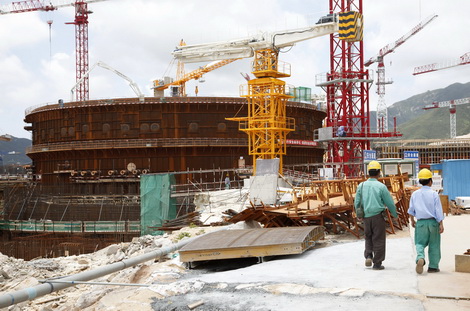Nuclear industry's growth to slow
Updated: 2011-08-31 08:57
By Liu Yiyu (China Daily)
|
|||||||||||
|
 A nuclear power plant in Taishan, Guangdong province. China will have 42 gigawatts of nuclear capacity by 2015, according to Zhang Guobao, former head of the National Energy Administration.[Photo/Bloomberg] |
BEIJING - The expansion of China's nuclear power industry will slow from the rapid rate of the 11th Five-Year Plan (2006-2010), but the country should avoid drastic changes in nuclear development policies, said a former head of the National Energy Administration.
"China's nuclear industry base is still weak and we must ensure development stability and consistency," Zhang Guobao, who also serves on the Chinese People's Political Consultative Conference, said in a speech posted on Tuesday on the website of the China Nuclear Energy Association.
China will have 42 gigawatts (gW) of nuclear capacity by 2015, equal to 3 percent of total installed power capacity, according Zhang said.
After the accident at Japan's Fukushima nuclear complex caused by the massive March earthquake and tsunami, China's State Council said on March 16 that it would suspend approvals of new nuclear power stations and order comprehensive safety inspections at all nuclear plants, including those under construction.
The inspection concluded in early August. No information on the inspections has been released so far.
China hasn't approved any new projects so far this year and the industry's development will slow compared with the past five years, said Zhang.
Work on four previously approved plants, which hasn't yet started, was also halted by the safety inspections.
Before the Japanese accident, another 10 units using the latest Westinghouse Electric Co AP1000 technology were in the planning stages.
Preliminary work on these projects was also suspended, according to the State Nuclear Power Technology Corp, a major nuclear technology developer.
Billions of yuan had been spent on preliminary work, and the suspension meant a loss of orders for dozens of manufacturers.
Additionally, China has 27 units at some stage of construction, representing 30 gW of nuclear capacity, or 42 percent of the world's total units under construction.
Zhang also said that China should use the inevitable slowdown in construction to address weaknesses in the sector, including manufacturing capacity and technological innovation.
Last month, China connected its fourth-generation reactor to the grid. The plant is an experimental fast-breeder reactor, which produces less radioactive waste than current designs.
Technological work on the CAP1400 model, which has a larger generating capacity than the AP1000 on which it is based, is also in progress.
Despite the vibrant development of renewable energy, nuclear power remains an irreplaceable choice for China to achieve the target of generating 15 percent of its electricity from non-fossil fuels by 2020, said Zhang. "We should take this crisis as an opportunity to catch up as the world's leading nuclear power country."
Related Stories
New nuclear plants may get green light soon 2011-08-12 09:25
China's nuclear power developers seek investors 2011-07-30 11:39
China still needs to develop nuclear power: Expert 2011-05-20 14:09
Sandvik still sees opportunities in nuclear power 2011-05-20 11:08
- eBay eyes up to 40% jump in China sales
- One-off gain boosts port operator's H1 profit
- Rothschild acquires 5.1% of China CYTS Tours
- Macao's economy expands by 24% in Q2
- When small businesses become big business
- Sina increases Tudou stake to 9% for $35.2m
- BYD planning layoffs in sales, marketing units
- Bombardier plans growth













